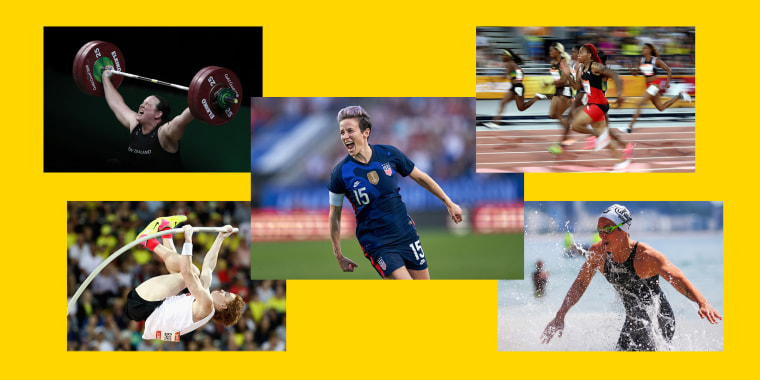Postponed by the coronavirus pandemic, the 2020 Summer Olympics will finally take place in Tokyo from July 23 to Aug. 8. But they’ll be different from any other Games — and not just because spectators are being prohibited.
There will be record participation by out LGBTQ athletes: at least 163, according to Outsports, nearly triple the 56 who participated in the 2016 Summer Games in Rio. About 34 will be from the U.S., including five members of the women’s basketball team and four members of the women’s soccer team.
The Tokyo Games will also be the first at which openly transgender athletes will compete, including New Zealand weightlifter Laurel Hubbard, who was selected for the women’s super-heavyweight 87 kilogram-plus (192 pound-plus) category.
Quinn, a mononymous trans soccer player who uses they/them pronouns, will also compete in the games as part of the Canadian women’s soccer team. Team USA has a trans member, BMX Freestyle rider Chelsea Wolfe, but as an alternate she might not get to compete.
One athlete who won’t be making the trip is U.S. sprinter Sha’Carri Richardson, who came out as bisexual in a 2015 tweet and thanked her girlfriend for choosing the fiery orange locks she sported at the June 19 Olympic track and field trials in Eugene, Oregon. Shortly after she earned a spot with an impressive 10.86 seconds in the 100-meter dash, Richardson tested positive for marijuana and was handed a one-month suspension that prevents her from competing in Tokyo.
The Games will also mark the first Olympics at which a Pride House has received official recognition from the International Olympic Committee. Similar hospitality suites for LGBTQ athletes and visitors have existed since the 2010 Vancouver Winter Games — with the exception of the 2014 Winter Games in Sochi, Russia — but Pride House Tokyo, in the capital’s bustling Shinjuku district, is the first officially recognized one, and it will remain a permanent community center after the Olympics end.
When the space was inaugurated in October, Pride House Tokyo Director Gon Matsunaka told reporters that it “will be a landmark that could change the landscape for LGBTQ people in Japanese society.”
Below, meet some of the more than 160 LGBTQ Olympians competing in the Tokyo Summer Games.
Rachele Bruni
Open Swimming / Italy
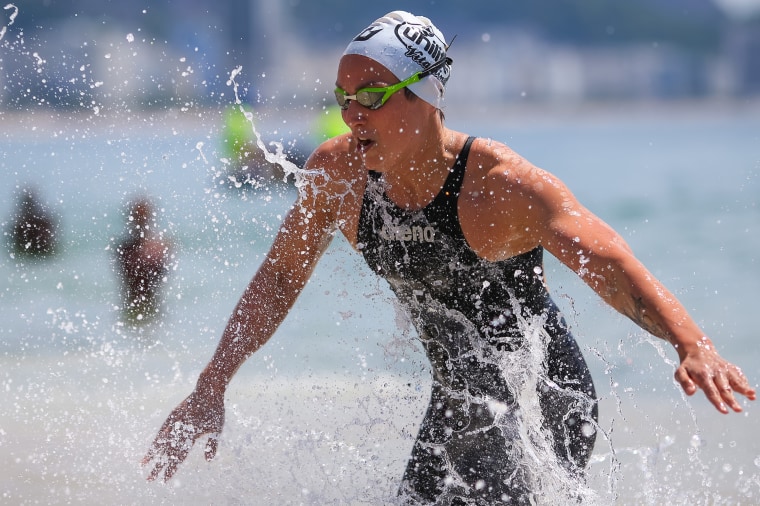
When Bruni, a distance swimmer, won silver in the 10km marathon at the 2016 Games, she dedicated her medal to her girlfriend, Diletta Faina.
“I never came out, but I never worried about prejudices, either,” Bruni, 30, a native of Tuscany, told HuffPost Italia at the time. “I live my life naturally.”
Bruni, Italy’s first openly gay Olympian, questioned whether it took courage to come out so publicly.
“I just know that it came naturally to me to think about my beloved and not about people’s prejudices,” she told HuffPost. “Undoubtedly there are people who still have prejudices, but I live peacefully, and I live for myself, for my passion for swimming, and for the people who love me.”
Bruni, an eight-time gold medalist at the European Open Water Swimming Championships, also won bronze and silver at the 2019 World Aquatics Championships in Gwangju, South Korea.
Isadora Cerullo
Rugby Sevens / Brazil
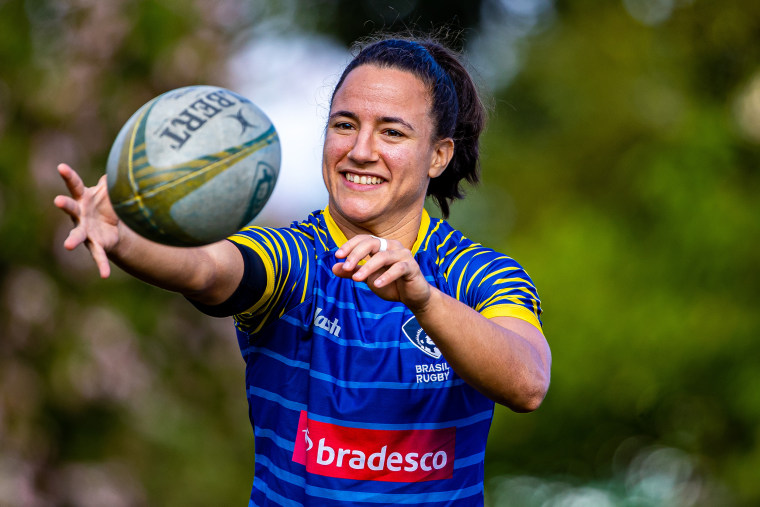
At the 2016 Games in Rio, Cerullo didn’t just thank her girlfriend, Marjorie Enya — she accepted her on-field marriage proposal, an Olympic first.
“As soon as I knew she was in the squad, I thought I have to make this special,” Enya told the BBC of her decision to propose. “I know rugby people are amazing and they would embrace it.”
Cerullo’s parents fled Brazil during the last years of the country’s military dictatorship, and she was raised in Raleigh, North Carolina. She has dual Brazilian-American citizenship.
In 2014, Cerullo and Enya moved to São Paulo, where Cerullo joined the Brazil women’s national rugby sevens team. The squad earned bronze at the 2015 Pan American Games and placed ninth at the 2016 Summer Olympics.
On July 7, Cerullo celebrated the couple’s fourth anniversary on Instagram.
“An Olympiad of love!” she wrote. “Four years of marriage and every time I remember that day, to affirm our journey together, the smile comes easy. [Marjorie], how lucky I am to have found you in this world. Thank you for choosing me and for being you, together with me.”
Shawn Barber
Pole Vault / Canada
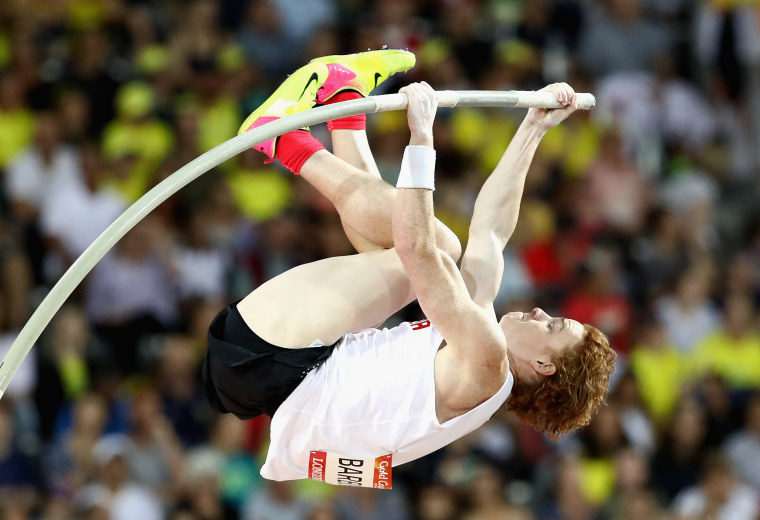
Barber, 27, a track and field star, is a onetime world champion in the pole vault, having reached a height of 5.90 meters at the 2015 World Championships in Athletics in Beijing. In 2016, he became the youngest man to vault 6 meters, finishing 10th at the Summer Olympics in Rio.
Barber came out in an April 2017 Facebook post, according to the National Post, declaring he was “gay and proud” and thanking his parents and friends for their support.
Barber said his sexuality “shouldn’t be a big deal,” but in an interview with The Toronto Star, he acknowledged that having dual U.S. and Canadian citizenship allows him to “be a bit more fearless in my actions. A lot of people don’t have the fortunate opportunities that I have and I’m very grateful for that.”
He almost didn’t get to compete in Rio, however, after he tested positive for cocaine at the 2016 Canadian championships in Edmonton. Officials accepted his testimony that he inadvertently absorbed the drug while kissing someone he met through a Craigslist ad.
“Life is ups and downs, pole vault is ups and downs, and I’m just along for the ride,” he said at the time. “And I’m enjoying every minute of it.”
Jack Woolley
Taekwondo / Ireland
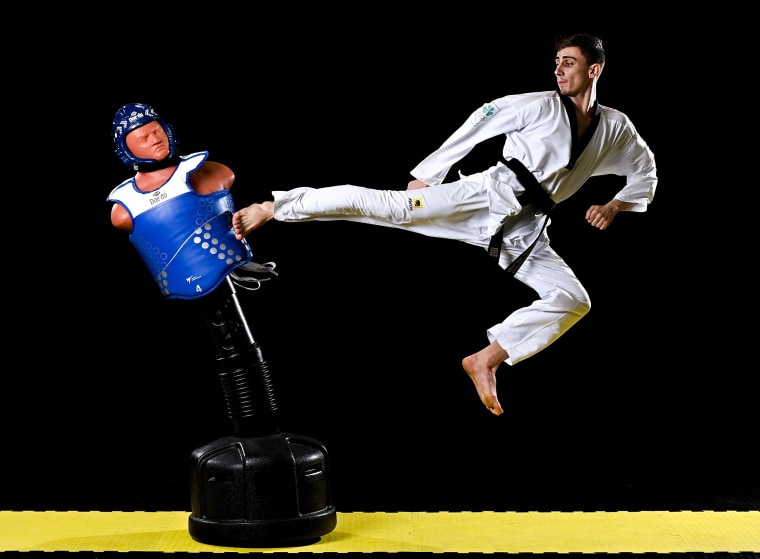
Just 5-feet-11 and barely 130 pounds, Woolley, 21, of west Dublin, has a slight build that belies a ferocious athleticism, which has made him the top-seeded fighter in his division and Ireland’s first Olympics representative in taekwondo.
Woolley heads to Tokyo after having snatched gold at the Mexico Open Taekwondo Tournament in June. But he won’t have much time to soak up the city — his event is scheduled for the first day of competition.
“If I come home with a medal, I arrive home on the 27th or 28th” of July, he told the Irish newspaper Echo. “So the Games will only be on three or four days by the time I actually arrive home. Like I’ll be sitting at home watching it after having been there. It’ll be a bit mad.”
His close-knit family has scrimped and saved to support his dreams, even selling eggs and little cookies shaped like “people kicking.”
Woolley, who identifies as bisexual, came out when he was 15. He said his friends and classmates never had a problem with his sexuality. That might be a sign of the times or it might be because he was the kid “who kicks people in the head for a living,” he told The Irish Times in 2020.
On the mat, however, it has been a different story.
“It was brought to my attention that it could affect my career,” he told The Irish Times. “You don’t know what people are going to be like. I’m cautious.”
Dutee Chand
Track & Field / India
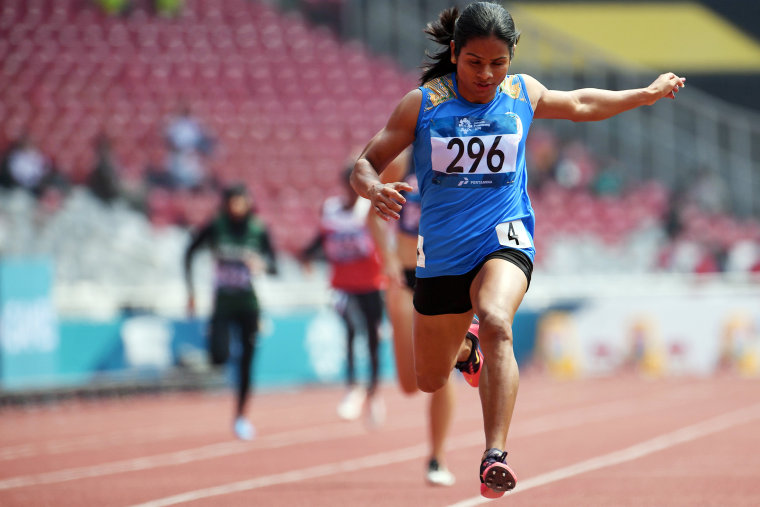
It was the Indian Supreme Court’s decision to decriminalize homosexuality in 2018 that inspired Chand, who competes in the 100- and 200-meter events, to come out, making her the country’s first openly gay athlete, according to The Washington Post.
In 2019, Chand told reporters that she had been seeing her girlfriend, who comes from her village, Chaka Gopalpur, for five years.
“I have found someone who is my soulmate,” Chand said, the BBC reported. “I have always believed that everyone should have the freedom to love. There is no greater emotion than love, and it should not be denied.”
While she faced backlash back home — some of it from an older sister who threatened to send her to jail — Chand signed a two-year endorsement deal with Puma in 2019.
But her career was almost derailed before it took off: In 2014, Chand was banned by the International Association of Athletics Federations, or IAAF, because she has hyperandrogenism, and her atypically high testosterone levels were too high for the organization’s standards.
Her attorneys successfully argued that the regulations were arbitrary and discriminatory, and Chand was reinstated in time to qualify for the 100-meter dash at the 2016 Summer Olympics.
Chand failed to medal in Rio, but she won silver in the 100-meter dash at the 2018 Asian Games in Jakarta, Indonesia. A year later, she won gold in the event at the World Student Games in Naples, Italy.
Chand told The Indian Express that the years before she was reinstated were “extremely tough.”
“The negativity, fear of my career ending prematurely, insensitive comments about my body, I have faced them all,” she said.
Chand has been an outspoken supporter of South African middle-distance runner Caster Semenya, who was also banned by IAAF’s rules about testosterone levels, and she even offered Semenya the use of her legal team.
Megan Rapinoe
Soccer / United States
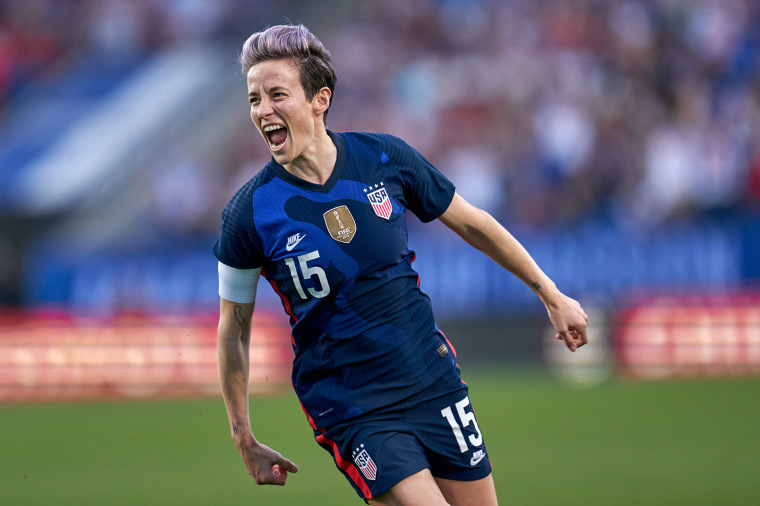
Rapinoe is one of the most famous women in sports, having led the U.S. national soccer team to Olympic gold at the 2012 London Summer Games and to FIFA World Cup championships in 2015 and 2019.
She’s also one of the highest-profile LGBTQ athletes, supporting causes like GLSEN (formerly the Gay, Lesbian & Straight Education Network) and Athlete Ally, which advocates for inclusion in sports. Her fiancée, Sue Bird, who will be in Tokyo playing basketball for Team USA, credits Rapinoe with having given her the courage to come out publicly.
“What Megan helped me understand was that, yes, what I was already doing was great, living authentically,” Bird told Time magazine this month. “But it was important to say it, because the more people that come out, that’s where you get to the point where nobody has to come out. Where you can just live. And it’s not a story.”
Rapinoe, 35, has never shied away from activism: She fiercely advocates for equal pay for women in sports and has taken a knee during the national anthem in solidarity with former NFL quarterback Colin Kaepernick and the Black Lives Matter movement.
She tweeted support this month for Sha’Carri Richardson, saying the International Olympic Committee’s decision to suspend her was “trash.”
Despite any controversy, Rapinoe is also one of the most popular women in sports when it comes to endorsements, having scored lucrative deals with Nike, Samsung, Procter & Gamble, Visa, BodyArmor, Hulu and other brands. She was also named one of the new brand ambassadors for the lingerie company Victoria’s Secret in June.
“So often I felt myself on the outside looking in with brands in the beauty and fashion industry,” Rapinoe said in a statement in June. “I’m thrilled to be creating a space that sees the true spectrum of ALL women.”
Tom Daley
Diving / Great Britain
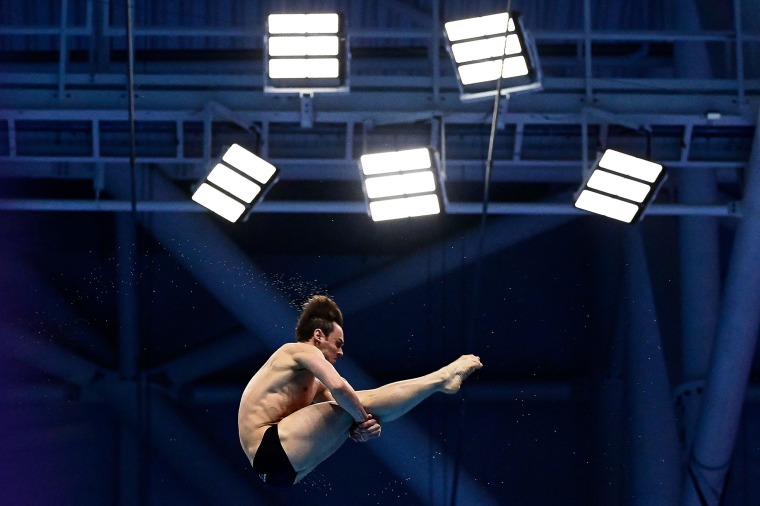
If Rapinoe is the face of queer women at the Olympics, Daley has become the standard bearer for gay men.
At 15, Daley, of Devon, won the 10-meter platform event at the 2009 International Swimming Federation World Championship. He went on to win European, Commonwealth and international titles, including bronze medals at the Summer Olympics in London and Rio.
Daley, 27, hopes to take home the gold at Tokyo with his new synchronized diving partner, Matty Lee.
He came out in a 2013 YouTube video, saying he had been dating a man since earlier that year and had “never been happier.”
“It really was love at first sight, I’d never felt like anything like it before,” he told ITV that year. “I’d never felt the feeling of love, it happened so quickly, I was completely overwhelmed by it to the point I can’t get him out of my head all the time.”
In 2017, he and Oscar-winning filmmaker Dustin Lance Black married in England and welcomed a son, Robert Ray “Robbie” Black-Daley, a year later.
Daley identifies as queer, telling British LGBTQ outlet PinkNews, “I am not 100 percent straight; I am not 100 percent gay.”
Quinn
Soccer / Canada
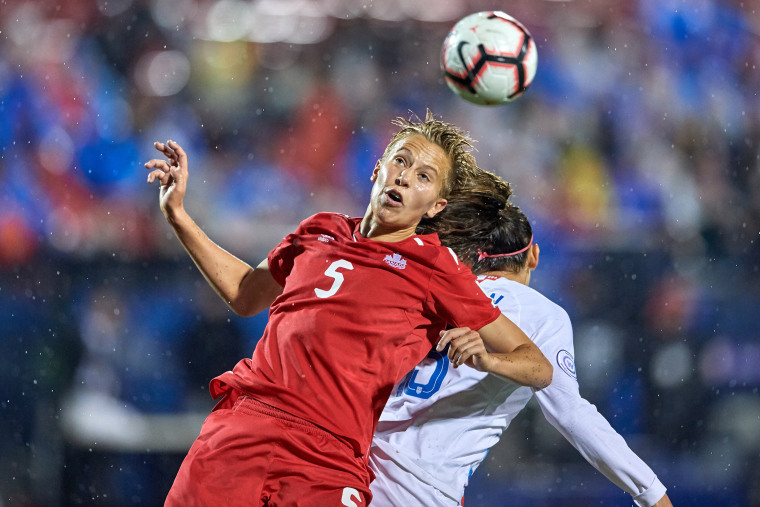
Quinn, a former Duke University women’s soccer star, came out as transgender in an Instagram post in September.
“Coming out is HARD ( and kinda bs),” they wrote. “I know for me it’s something I’ll be doing over again for the rest of my life. As I’ve lived as an openly trans person with the people I love most for many years, I did always wonder when I’d come out publicly.”
Quinn, 25, a native of Toronto, made their debut with the Canadian national team in 2014 and helped Canada earn its second consecutive bronze medal at the 2016 Summer Olympics.
In 2018, they were selected third overall in the National Women’s Soccer League draft, signing with the Washington Spirit.
In June, Quinn posted a picture to Instagram holding a Spirit jersey with their number in the colors of the rainbow Pride flag. In the caption, they praised their teammates, writing, “They have embraced change and leaned into uncomfortable conversations and I love them for it.”
Nick Wagman
Dressage / United States
Wagman, 48, an equestrian who lives in San Diego with his husband, Kurt, spoke publicly about his sexuality for the first time this month on the Outsports podcast “Five Rings to Rule Them All.”
Wagman said he fell in love with horses at summer camp when he was 9 or 10.
“Not knowing that I was gay at the time, I felt a little bit awkward around my peers, and this was a really good outlet for me to put my energy into,” he told host Cyd Zeigler.
Horses are also what got Wagman through high school “in one piece,” he said.
“I didn’t have a lot of gay friends, to be honest with you. ... I was targeted as ‘the gay kid,’ even though I wasn’t out. So this was my outlet. It was my safe space.”
While gay men are far less represented at the Olympics than lesbians — by a ratio of more than 10 to 1 — dressage is something of a safe space for out male athletes: In addition to Carl Hester, representing Great Britain, and Domien Michiels, riding for Belgium, longtime partners Edward Gal and Hans-Peter Minderhoud will compete for the Netherlands.
British Paralympian Lee Pearson will also compete in Tokyo after having earned an incredible 11 gold medals in equestrian events in five previous Paralympic Games.
Michelle-Lee Ahye
Track & Field / Trinidad and Tobago
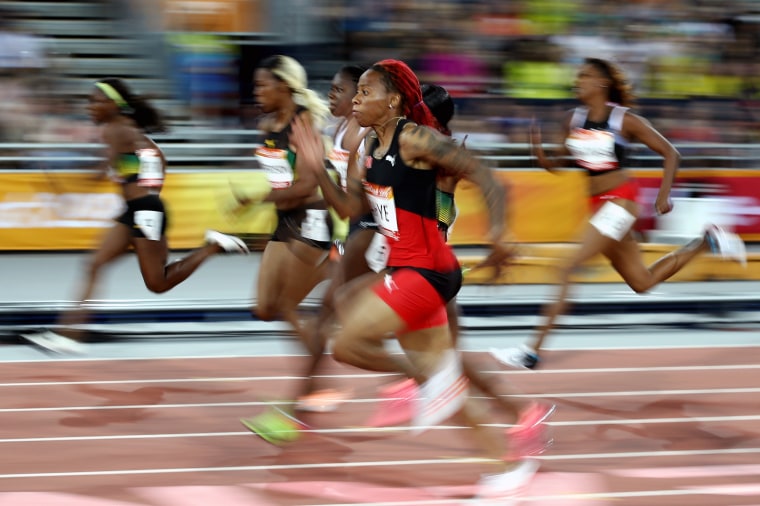
On April 9, 2018, Ahye became the first Trinidadian woman to win a gold medal in any major track and field event when she clocked an impressive 11.14 seconds in the 100-meter dash at the Commonwealth Games in Australia.
Three days later, Trinidad and Tobago’s High Court declared the country’s colonial-era “buggery” law unconstitutional, decriminalizing consensual sexual acts between adults.
The ruling was met with controversy in the Caribbean country, and Ahye, who had not previously discussed her sexuality, was outed in a front-page story in the Trinidad & Tobago Guardian.
In a letter to the editor, sports lawyer Emir Crowne condemned the article as “a thinly veiled attempt by the Guardian to trade off the recent and intense interest in LGBTQ issues and rights.”
The newspaper eventually issued an apology, saying the story “did not meet our high standards for publication.”
“We realize our society is on the cusp of a new era of civil rights, one that grants full freedoms to our loved ones, friends and fellow citizens of all sexual orientations. We will learn from our error,” it said.
That spring, Ahye married her longtime girlfriend in the U.S. They have since separated.
Ahye, whose Twitter profile lists her as a “stud lesbian,” earned a spot at the Tokyo Games last month with a 10.96-second finish at the North American, Central American and Caribbean Athletic Association's New Life Invitational in Miramar, Florida.
Douglas Souza
Volleyball / Brazil
Most out male Olympians compete in solo competitions, but Souza has excelled in a team sport — joining the Brazilian men’s national volleyball team in taking the gold in Rio in 2016 after a 3–0 victory over Italy.
Souza, 25, was also a gold medalist at the 2019 World Cup, a two-time champion at the Men’s South American Volleyball Championship in 2017 and 2019 and a silver medalist at the 2014 International Volleyball Federation’s world championship in Poland.
During the year, Souza, who has been out for most of his career, competes in the Brazilian Superliga as a member of São Paulo’s Vôlei Taubaté. In an interview last year, he was asked how he wanted to be remembered.
“I want to be remembered as Douglas, who made history as the first homosexual in volleyball who managed to play at a high level,” he said, according to World of Volley. “I want to be a mirror of nonstandard people. I am nonstandard. I’m also extremely thin and that scares some people. If I, a skinny, tiny boy from the interior of São Paulo, succeeded, you’ll also succeed. That’s how I want to be remembered.”
Souza frequently posts pictures with his boyfriend on Instagram, writing in April: “As I tell you every day, I love you infinitely. I choose you forever.”
Laurel Hubbard
Weightlifting / New Zealand
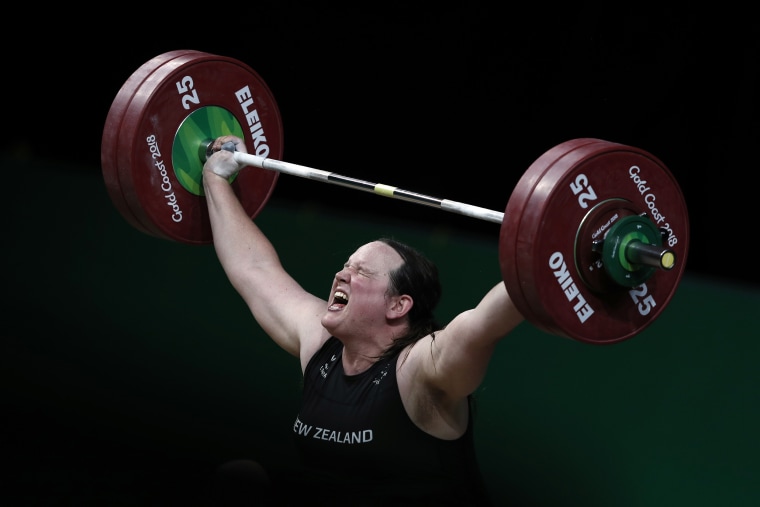
No LGBTQ Olympian has gone into the Tokyo games under a greater spotlight than Hubbard, 43, who transitioned in her mid-30s and has competed at the women’s international level since 2017 — two years after the International Olympic Committee introduced guidelines requiring that trans women athletes have total testosterone levels below 10 nanomoles per liter for at least 12 months before competition. (The typical female testosterone range is below 1 nmol/L.)
In a statement announcing the team roster, New Zealand Olympic Committee CEO Kereyn Smith said that, based on the IOC policy, Hubbard had met eligibility criteria for the International Weightlifting Federation.
“We acknowledge that gender identity in sport is a highly sensitive and complex issue requiring a balance between human rights and fairness on the field of play,” Smith said. “As the New Zealand team, we have a strong culture of manaaki (caring) and inclusion and respect for all.”
Hubbard's inclusion has been divisive, with her supporters welcoming the decision while critics have questioned the fairness of transgender athletes’ competing against cisgender women.
Emily Campbell, a British weightlifter who will compete against Hubbard in Tokyo, said she supports Hubbard’s participation.
“She is a human being and she has qualified for this competition fairly like everyone else has, following rules that we all have to abide by,” Campbell told the Independent last month.
Former Olympian Tracey Lambrechs of New Zealand is among Hubbard's critics. Lambrechs said she was forced to drop a weight class to qualify for the 2018 Commonwealth Games because Hubbard was chosen for her event.
“Everyone’s just shut up and worried about how they’ll be viewed in regards to talking out about transgender athletes,” Lambrechs told Radio New Zealand. “If Laurel was to win gold, then the next biological female should also win gold. ... Then Laurel would be an Olympic champion as a transgender [person] and then we would have our female athlete as an Olympic champion as well."
With the growing criticism and online harassment, Hubbard has largely declined interviews and remained off social media in recent years.
“I am who I am. I’m not here to change the world,” Hubbard told Radio New Zealand after she won two silver medals at the 2017 IWF world championships. “I just want to be me and just do what I do.”
She last competed internationally in March 2020, coming back from having ruptured an elbow ligament during a snatch attempt two years previously, which nearly ended her weightlifting career.
“When I broke my arm at the Commonwealth Games three years ago, I was advised that my sporting career had likely reached its end,” Hubbard said in the team announcement. “But your support, your encouragement, and your aroha carried me through the darkness,” she added, using the Māori word for “love.”
